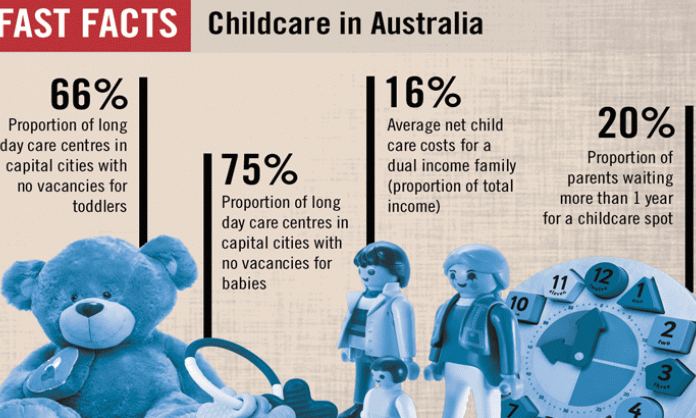Child care in Australia is expensive and hard to find. Even when it’s available, stressed-out parents must run the gauntlet of morning traffic in the “double drop-off” – where one child attends school and another attends day care.
The childcare industry itself is in crisis. According to the Productivity Commission, unmet demand for child care currently sits at around 600,000 places. Long waiting lists mean that a pregnant woman can sign her future child up for care, and still have to wait more than a year after she’s ready to go back to work for a place to open up.
For parents lucky enough to find their child a place at a day care centre, the financial cost can be enormous. The average price of long day care is around $75 per day. Daily fees for inner suburban or high demand areas can reach $100 or more. Even with meagre government rebates and benefits, low income families are being priced out of access to quality care.
Some parents are finding that, due to the cost of child care, they simply can’t afford to work. Overwhelmingly, the role of stay-at-home parent still falls to mothers. Since women full time workers still earn, on average, 82 cents for every dollar earned by their male counterparts, they are more likely to be the ones to drop out of the workforce after having kids. Staying at home is a lifestyle option for wealthy women; for women in low income families, it can be a financial necessity.
With formal care unaffordable, parents seek support from their families, grandparents being the largest source of informal childcare arrangements. Research commissioned by the Council on the Ageing NSW found that grandparents are performing unpaid child care to the value of $88 million a year in that state.
In childcare surveys, grandparents often report that they value the time they spend with their grandkids, and that the joy of sharing time with them is all the reward they need. This demonstrates the love that family members show in caring for each other, but capitalism doesn’t see it this way.
Child care and capitalism
To capitalism, if workers are “human resources”, their kids are potential human resources. Without children, parenting, child care, education and training, there would be no future workforce. Raising a generation of workers helps sustain the whole system.
The capitalist culture of atomisation and individualism feeds us the line that we should fend for ourselves and that families – no matter how poor – should bear financial responsibility for their kids. How many times have we heard recipients of government benefits – especially single mums – denigrated as “bludgers”?
The idea that we have no right to expect help raising kids and that individuals, rather than society as a whole, should care for the young, means that bosses can get away with taking no responsibility for the care, education and socialisation of people they will eventually exploit in the labour market.
Ultimately, we need a different type of society – one that structures child care around collectivity, not atomisation, and that prioritises what’s best for kids and parents, not for big business. But even far short of revolutionary social change, there are many ways to improve the situation.
We can demand free, government-funded child care, and a scheme to expand childcare centres in areas with high demand. We could fund it through higher corporate tax rates. Crèches at large workplaces would mean women could stay in employment while being close to their kids. They would also vastly simplify the logistics of getting to day care and back.
Respect
One vital step we can take toward better quality child care and more government funding is to support the Big Steps campaign by United Voice, the union representing childcare workers.
More than 97 percent of childcare workers and early childhood educators are women, and as a result wages in the industry are low. Certificate III early childhood workers earn as little as $19 per hour – $10 per hour less than workers with equivalent qualifications in other industries.
Low wages mean that dedicated professionals can’t afford to stay in the industry. A wealth of experience is lost to staff turnover: 180 overworked, underpaid childcare workers leave the industry every week.
United Voice is campaigning for equal pay for childcare workers and early childhood educators, and for government funding to meet this claim – which would cost $1.4 billion per year. This is a small price to pay for quality care.
Working class parents, their kids and childcare workers all have the same interests: high quality, free and accessible child care, provided by workers who are treated with respect and paid a decent wage.








